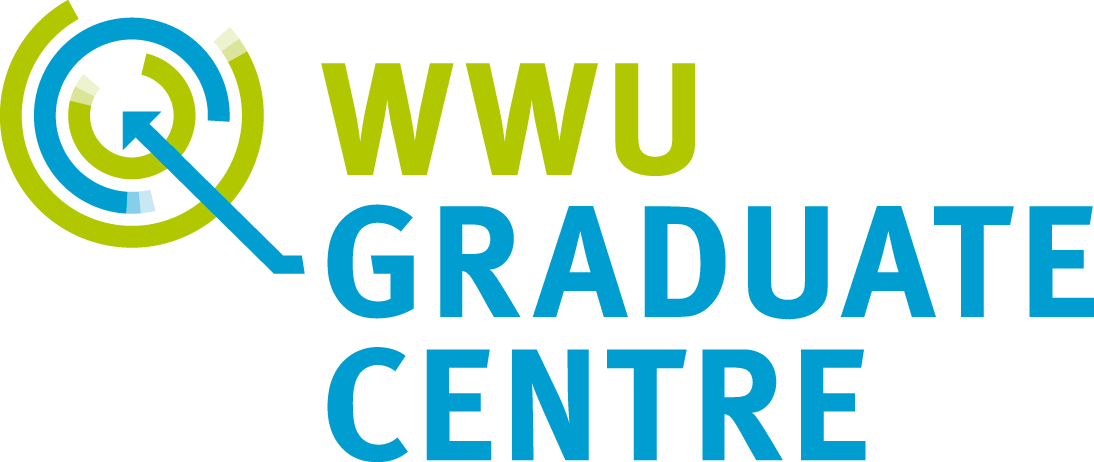The fundamental objective of IP@WWU programme is to contribute to a greater internationalisation of PhD studies at WWU using goal-oriented measures, thus securing WWU's competitiveness against other universities. The project rests on pillars which demonstrate our commitment to sustainability and intent to increase the attractiveness of WWU by means of improved offers for the internationalisation of PhD programmes. Creating information materials, establishing a network, developing a solid funding structure and long-term partnerships are all roads leading to sustainability. These measures draw on extensive experience gained from the WWU's smartNETWORK international IPID project (International PhD study in Germany).
1. Developing supporting structures
Networking with institutes and departments. The Graduate Centre as a central structure is already very well connected. The IP@WWU project will further expand this network and use it more extensively in order to build a web of people and institutions to drive the internationalisation of PhD study.
Data collection. Due to WWU's pioneering role in research data management, the project will involve gathering comprehensive data on PhD students' stays abroad and cooperations with foreign institutions at the level of PhD study. For this purpose, a structured and coordinated data collection will take place.
Development of mechanisms for regular data collection. Mechanisms for regular data collection will be developed in collaboration with centralised (controlling) and decentralised partners (departments). The data will be gathered annually.
2. Promoting information flow
Communication in IP@WWU project flows through two main channels: decentralised institutions on the one hand, and a structured information platform providing necessary information to PhD students interested in spending a period of their study abroad on the other.
3. Increasing mobility of PhD students
Stipends. An important means to increase the mobility of PhD students are stipends for research stays abroad and get-to-know stays in Münster.
Preparatory workshops for "Outgoings". Workshop content revolves around intercultural competence and intercultural communication. Preparatory workshops will ensure that programme participants are well prepared for their research stays abroad.
"LET OTHERS KNOW!" - Establishment of an alumni group. Stipend holders' personal narratives after return to Münster will serve to raise interest in research stays abroad: funding depends on the agreement to tell other PhD students in one's respective academic environment about experiences abroad (e.g. colloquim, group meeting, staff meeting). The "top-down" strategy ("centralised" payment of stipends) will thus be enriched by an effective multiple nuclei strategy.
Sustainable stipend structure. IP@WWU's goal is to create structures that promote the internationalisation of PhD study by means of stipends, and secure success achieved during IPID4all funding phase in the long run. Apart from the establishment of an active alumni group and the dissemination of best practises, creation of sustainable financing options for stays abroad also plays a pivotal role.
Regular evaluation. All above mentioned tools will be regularly evaluated and modified.
4. Establishing long-term cooperations and agreements
A strategy aiming at sustainability does not only include stable funding (Goal 3), but also an international network.
Identification of partners WWU-internally and at international level. In order to create a network that will drive the internationalisation of PhD study, WWU-internal partners who seek to forge strategic partnerships in line with WWU's internationalisation strategy must first be identified. Next step is to identify foreign partners (universities, faculties, institutes) who are interested in active and sustainable cooperation with WWU at the level of PhD study.
Identification of research projects. Having found internal and foreign partners, research projects suitable for a long-term cooperation between PhD students should be identified and conceptualised.
Initiation of agreements. The aim is to further build on the above preparatory work and conclude agreements with outstanding partners seeking to strengthen their cooperation. This is another tool to improve attractiveness of WWU for PhD students. The WWU Graduate Centre and the International Office will support partners initiating and formulating Cotutelle-Agreements.
International Research Training Group (Graduiertenkolleg). The partners will be encouraged to undertake cooperative activities not only in terms of single PhD projects, but to develop general conditions for International Research Training Groups. They will be aided by WWU's Application Advisory Service (SAFIR) and the IP@WWU project (e.g., travel cost coverage).


